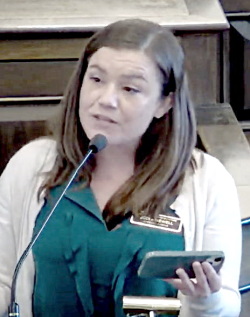After years of litigation, settlements have finally been reached in the multitude of lawsuits that were filed by states and municipalities against the companies involved with creating and exacerbating the opioid overdose crisis.
The state of New Hampshire should be receiving about $310 million over the next 20 years, which it is doling out through various grants to municipalities and organizations working to reduce the damage caused by substance use disorder (SUD). As a party to the lawsuits, City of Keene has itself received $113,000 so far, with a bit more to come in subsequent years.
Keene’s City Manager and Police Chief have proposed spending the money on a social worker position within the Police Department, to focus on issues related to substance use and mental health. While having a social worker on city staff is an idea that certainly has a lot of merit, many are concerned that having that position be a part of the Police Department will limit the effectiveness of the role.
This is because, as I explained in my recent letter to the editor of the Keene Sentinel, many substance users have a deep-rooted distrust of police, and will be unlikely to engage positively with any public official who they perceive to be a cop. Instead of creating this barrier that will prevent people from getting the help they need, I would prefer to see the social worker position be a part of the city’s Emergency Medical Services. Make it a healthcare role, not a criminal justice role.
My friend and ally, State Representative Jodi Newell, has been raising broader concerns about the process through which decisions are being made about how this money is to be spent. She feels strongly – and I agree with her – that more voices need to be part of the conversation.
As Jodi wrote in a 2020 research paper entitled “Substance Use Disorder in New Hampshire”:
An impacted community should have a significant role in designing solutions to the issues they’ve experienced…. Unfortunately, in regard to SUD treatment and recovery, there are few seats at the table held for leaders in that community, most of whom have struggled with SUD themselves and spent decades in recovery helping others. Instead, there seems to be a preference given to members of law enforcement and well-liked legislators, who tend to err on the side of abstinence under threat of punitive action. Nowhere in my research or in my conversations have I found any evidence that this approach is helpful.
Jodi herself is a leader in that community, having lost the father of her two children to an overdose 14 years ago. The pain of that loss has been compounded by the stigma that she and her children have had to face as family members of an overdose victim. While it would be easy for Jodi to cave to the stigma and not speak publicly about her experience, she has instead devoted herself to advocacy for people, like her, who have had their lives shattered by the opioid epidemic.

Jodi has been quite effective in this endeavor. During the last Congressional session, she was a major force in lobbying federal legislators to pass the MAT Act – creating options to enable broader Medically Assisted Treatment for opioid use. And when she’s not at her job working in a homeless shelter, or at her job working on the floor of the State House in Concord, she’s at her job working for Rights and Democracy as a statewide organizer focused on the overdose crisis.
All of this is to say that Jodi knows what she is talking about when it comes to the topic of substance use disorder, and that her views are well-founded, deeply researched, and built on a foundation of lived experience. When she speaks about harm reduction and overdose prevention, the rest of us really ought to listen.
In a recent letter to the editor of the Keene Sentinel, Jodi called for a broad public discussion of how the opioid settlement money can best be used to help people affected by substance use disorder. She wrote:
Our challenge now is to use this money to stem the tide of overdose deaths. We must address the humanitarian disaster that big pharma and its network so callously created, which was exacerbated by policies that focus on criminalizing addiction at the expense of harm reduction… with that in mind, I am asking our city leaders to facilitate public listening session where the vast knowledge and experiences of those directly impacted by the overdose crisis may be heard and incorporated into the broader plan concerning the use of opioid settlement resources.
Wise thoughts. As a member of the Keene City Council, I’m certainly paying attention, and I’m ready to do whatever is needed to make sure that conversation happens.

